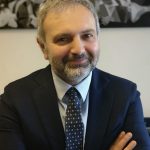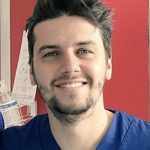Out of the blue, into the black
The dark age of Covid-19 disrupting the activity of pancreatic surgery at Verona University Hospital: a far cry from renaissance?
At the time of our writing, in Italy the Covid-19 pandemic already passed its first peak. In July, the number of new cases per day fell to an all-time low (since the beginning of March), after which it registered a slow and fluctuating, but constant, increase. This so-called “phase 3” of the pandemic implicates a forced coexistence with the virus, which hopefully will not progress into a catastrophic second peak only thanks to the constant application of essential security and screening measures, and a new common awareness.
It is clear to everybody that this pandemic will still characterize our daily life for some time, whose duration is still not precisely determinable but probably not very short. The most optimistic estimates suggest that the whole 2021 will still be characterized by the long-wave consequences of the pandemic.
Uncertainty about the present and pessimism, or even fear, towards the near future characterize the spirit in which our surgical activity restarts. After a “storm” that forced us to run for cover, by completely canceling (and then, reducing to about 25%) our elective activity during the peak phase, we now find ourselves leaving the shelter and calculating the damage that that storm left behind.
ONCOLOGICAL DAMAGES
It is still too early to understand, or evaluate with objective parameters, the biological damage caused to many of our cancer patients by the delay, or even the failure, to reach their surgery. Among those damaged patients we include both those already diagnosed with a malignancy who were waiting for surgery, and those suffering from a pre-neoplastic pathology who required prompt treatment to avoid progression. Unfortunately, we hardly imagine this damage to be outside a range that goes from “serious” to “disastrous”.
To mitigate the consequences of the delay on potential disease progressions, it was decided to prioritize, if possible, a neo-adjuvant chemotherapy (and radiotherapy) approach. In doing so, however, it was also necessary to take “off-label” therapeutic decisions in terms of treatment sequencing and time-windows to undergo surgery after preoperative therapy, which made patient selection for explorative surgery even more difficult than before.
PSYCHOLOGICAL BURDEN
The psychological burden which all of us (healthcare personnel, patients, and their loved ones) are forced to share during this “phase 3” is evident in the immediate present.
- The patient: during first Covid-19 peak, the patient suffering from a pancreatic disease had to add to the huge psychological burden of his condition the uncertainty of being properly treated, or the impossibility to choose his care provider. Now, he must experience discouragement and frustration due to the lengthening of waiting lists, and prostration due to prolonged preoperative chemotherapy. He struggles to reach his surgery, which is often seen as the one-and-only goal of the therapeutic path, and as synonymous with healing and cessation of all anguish.
- The healthcare worker: despite being a victim (like anyone else) of this pandemic emergency, the surgeon is forced to personally deliver to patients the pain originated by the jamming of the health care machine. Our role of “front office” with patients, and our deep understanding of the possible consequences of surgery delays on patient’s health, generates on us a profound sense of guilt. Shortening the long waiting lists is difficult with the available resources and requires short-term planning only. In attempt to avoid further delays multiple operations, even the long and complex ones (i.e. Whipple), are often scheduled in a single operating session. An unforeseen delay in the first surgery may mean not performing the second, causing postponements, rescheduling, and increase of patient’s discomfort. The rise in number of patients treated with pre-operative chemo and radiotherapy (for the reasons listed above) is also associated with an exponential increase in the technical difficulty of the surgeries.
Frustration, guilt and uncertainty are therefore accompanied by an increase of the usual workload. Nurses and health workers share it with the doctors, managing patients who are often more complex and more physically and psychologically fragile than before. Nurses and health workers also carry the additional burden of new preventive isolation precautions which require extraordinary measures despite ordinary, if not sub-optimal, resources.
SUSPENSION OF TRAINING
Suspension of training is a direct effect of the increase of technical difficulty of the surgery, a difficulty still faced during a daily marathon, to fully exploit the available operating sessions. In this scenario, experienced surgeons are forced to work with maximum effort and at the limit of their own abilities. Therefore, there is no longer room for training, as the fundamental prerequisites for the transmission of practical knowledge in a safe, profitable way are missing. Everyone considers it as a necessary evil for the greater good of the patient, with no solution in the short term. However, this does not spare the experienced surgeon from bitterness, nor the trainee from frustration, as they both know that training years are a unique but fleeting treasure, happening here and now.
RESOURCES AND NICHILISM
Only a substantial increase in currently available resources, as requested by all areas of our society facing crisis due to Covid-19, could guarantee the rapid disposal of our long waiting lists and a return to normal working routine. However, in the absence of a “magic wand”, capable of erasing Covid-19 and its consequences from the face of the earth, there are no scenarios that foresee a complete return to normality before late 2021, and only if an effective vaccine is produced and distributed in record time. The Italian Health Authority has withstood the brunt of the first wave with difficulty, and we are preparing for the winter, in which a sudden rise in the number and severity of cases may happen. Unemployment already reached record rates, while the future economic crisis is still not fully quantifiable but will certainly require extraordinary measures. Is it therefore the right thing on our part, in good faith and at the best of our knowledge, to demand for more resources? Resources to be used for a super-specialized surgery, fundamentally dedicated to a rare disease (pancreatic cancer) which unfortunately still harbor a dismal prognosis? Is our work truly indispensable during these hard times? We think so. But coming to doubt it certainly represents the darkest hour of our careers.
CONCLUSIONS
The resources we (all) ask for will probably not be sufficient, as we will share them with other distressed areas of our society. Therefore, we must seek for solutions that will allow us to return to an optimal care, changing some of our priorities. We should apply a strict spending review, identifying those sectors that can be cut from health-care costs without making substantial changes to the quality of care. For example, we should ask ourselves (the writers have no answers) if the costs of minimally invasive surgery, robotics in particular, are sustainable in the near future, at least until a return to “normality”. Covid-19 has taught us that smart-working can be implemented, improving the quality of life of workers while maintaining high standards, even in the health sector. Also, Covid-19 forced us to become aware that some off-label treatments are, from an evidence-based point of view, not so different from some other standard treatments that we were arbitrarily practicing, following habits and extrapolations (for example, an “optimal” time-window between preoperative chemotherapy and surgery in pancreatic cancer is still unknown). We must search for answers the only way that we know: as scientists. Avoiding habits and extrapolations will certainly save us resources. Finally, in the surgical area, it will be a priority to direct resources to surgical oncology, which will finally, without further hesitation, be centralized in high-volume centers, while general surgery will be delocalized to second-level centers. This will allow a better allocation of the available resources, prioritizing quality of care and avoiding waste.
Right now, during hard times, each one of us must donate his best effort to meet the needs of our wounded community. Within a public health in serious troubles and during a pandemic with uncertain evolution, it is essential to rediscover the pillars that will allow us to rebuild a society that cares about the future.
Whatever will be, we will be better, because we will have learned.
Professor Roberto Salvia

Dr Giovanni Marchegiani
